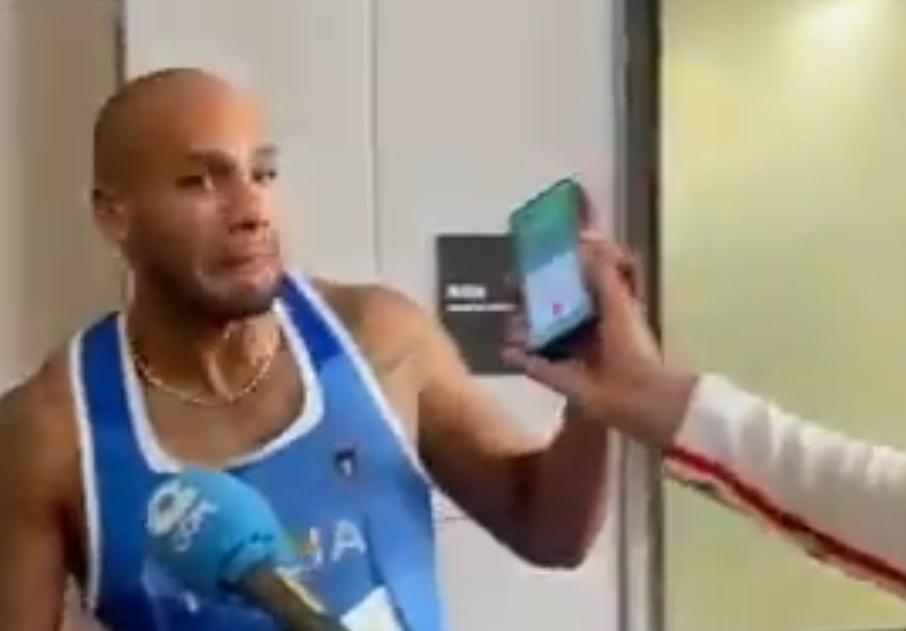If you’re anything like me, you:
a) see opportunities for learning absolutely everywhere and
b) are galvanised by the recent victory of Lamont Marcell Jacobs at the Men’s 100m at the Olympics!
Just in case you hadn’t heard yet, yesterday was a pretty big day for Italian athletics: first, Gianmarco Tamberi won the gold medal in the high jump and in a pretty extraordinary move, he shared the gold with fellow athlete and friend Mutaz Barshin. After only a few minutes, US-born, Italian athlete Lamont Marcell Jacobs won the gold metal in the 100m race, one of the most iconic races in the Olympics.
Everything we can do in the classroom with Jacobs’ victory
As we know, using authentic materials and topics that can engange our learners is crucial in the secondary school classroom. And what’s better than leveraging such a historic moment with such an interesting character as Jacobs?
So, I have collected the 7 ideas I have had just today for ELT lessons! The principles behind these ideas can be recycled for other similar events, of course.
1. WebQuest
Who is Lamont Marcell Jacobs? Learners are likely to find his name a little odd-sounding for an Italian, which gives us the perfect opportunity to engage them in a WebQuest on his origins and bio. They could run a quick free Google search on him using, for example, Wikipedia, or a more structured search with pre-set questions (such as “where did Jacobs train?” “what was his dream job as a child?”).
2. Trivia quiz
How much do your students already know? Find out a few interesting facts about Lamont Marcell Jacobs (for example, did you know he is only 26 but already has 3 children?), put them together in a trivia quiz, split your learners into teams (or breakout rooms) and see who can guess the most correct answers! If you speak Italian, here’s a good source to start.
3. Vocab focus
We can say without a shadow of a doubt that Jacobs perfectly embodies the essence of the underdog: pretty much nobody would have guessed he would win such an important race, and yet he did. Discussing his performance in class may be the perfect opportunity to introduce some interesting and relevant vocabulary, such as underdog or historic. Remember, though: only a few new lexical items per lesson to avoid overload, and plenty of spaced practice in future lessons to aid vocabulary acquisition.
4. Trim the video
Did you know you can easily trim a YouTube video and share it? I have used this video, with the commentary of the race, and trimmed it using Hashcut. The result was this 30-second video which includes the race and the moment Jacobs wins and hugs Timberi (I’m not crying, you’re crying…)
You can use this very short video to introduce Jacobs’ performance (which various learners may already have seen): understanding what is happening really does not require a high degree of listening comprehension. With low levels, for example, you can ask them to explain what happens in the video and what they think the tone of the commentators is (i.e. surprised, excited).
5. Show the full video
If your learners are a little more advanced, you can also use the full video (ca. 7 minutes). One idea is to first show the trimmed version, then the full version and reflect on the top-down knowledge gained from the first section: how does it help comprehension? To adapt the level of difficulty of this exercise, you can activate the subtitles or the transcript.
6. Intertextuality: using social media
What are people saying about this victory? And how does it relate to broader historical circumstances?
Exploring social media (safely, of course) is a nice way for students to make connections with the meaning of Jacobs’ victory beyond the mere event. For example, look at this tweet:
Students can be asked to make sense of it, which entails making a connection to previous victories that Italy has had this year: the Eurovision Song Contest, the football Euros and even Timberi’s gold medal just minutes before Jacobs.
7. Understanding humour
As with everything these days, the internet goes wild when events like this occur, finding the funny side at every opportunity.
As for Jacobs’ victory, two fun and endaring (but still meaningful) moments you can share with your students are the following:
1. Jacobs speaking English
In this short extract from an interview, Jacobs struggles to think of an English word. It is endearing but also a good lesson for students, who can see that even highly qualified athletes can have flaws! You can also use this video to compare and contrast it with other non-native speaker athletes, such as Berrettini or Federer.
2. Jacobs getting Draghi’s call
While he was being interviewed by a Spanish journalist, Jacobs got a call from Italy’s Prime Minister Mario Draghi. His face was absolutely priceless!

I hope these ideas are useful! Do you have any other ideas for a lesson on this historic win? Let me know in the comments or send me a message using the form:

